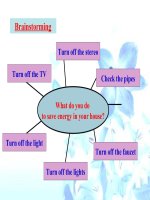Unit 8 lesson 2 speak listen period 45 week 15
Bạn đang xem bản rút gọn của tài liệu. Xem và tải ngay bản đầy đủ của tài liệu tại đây (72.43 KB, 3 trang )
Gi¸o ¸n TiÕng anh 8
Phßng gi¸o dôc MÜ hµo
Trêng thcs d¬ng quang
TuÇn: 15
45
Ngµy so¹n:
d¹y:
TiÕt:
Ngµy
Unit 8 country life and city life
Lesson 2 Speak & Listen
A. The objectives
- By the end of the lesson, Ss will be able to use the language to talk about the
changes of the town, and the changes in their hometown
They’ll listen to the dialogue and fill in the missing words
b. content: Vocabulary: words to talk about city and country: modern, busy,
noisy, tall, beautiful, dirty, expensive, etc
words to talk about the arrangement: arrive, come, visit,
Grammar: Present progressive to talk about the future, and the changing
situations
C. Materials: Poster, pictures
Work arrangements: Individuals, pairs, groups, T-WC
Anticipated problems: Students may find it difficult to speak about the
changes. Students are too young to experience the changes.
D. Procedure
I. Warmer
Brainstorming
Organize teamwork
Ask students to give example
sentences with these words/
phrases
City life
noisy, dirty, tall
building,
polluted,
expensive,
busy, modern,
entertainments
,…
Country life
fresh, cheap,
friendly, poor,
boring, nothing
to do, quiet,
peaceful, …
II. Checking the old lesson
III. New lesson
Pre-speaking
Picture presentation
Elicit from the picture
Were there any tall buildings in the
town five years ago?
What about the present?
There are more tall buildings
now
Was there a little traffic ?
Is it busy now?
The town/ traffic is becoming
I. Speak
1. Work with a partner. Look at the
two pictures and talk about the
changes of the town. The word
prompts in the box may help you.
The town is becoming busier
There are more tall buildings
The traffic is getting busier
The houses are getting more
modern
The town is becoming more
beautiful
Vò M¹nh Hµ / / 0982928076
1
busier.
Get students to practice these
sentences aloud
Concept check:
Meaning
Form:
Use: to show changes
While-speaking
Run through the words in the box
Which
do
these
adjectives
describe?
Ask students to work in pairs to
make comparisons between the
two pictures.
Get some pairs to speak in front of
the class
There are more green trees and
flowers
The streets are becoming noisier/
dirtier/ larger
There are more factories and
companies
Life is getting more comfortable
Most things are becoming more
expensive
2. Work with a partner. Talk about
changes in your hometown.
Post-speaking
Ask students to work in groups of
four to talk about the changes in
their hometown
(use the photos)
Focus on these things: houses,
people’s life, facilities, streets,
jobs, entertainments, etc
Ask some presenter to present
their group’s work. Other groups
II. Listen
can add or give comments.
Fill in the missing words
Pre-listening
Set the scene: who’s this? What
are they doing? They are talking
on the phone.
Who makes the phone? Why does
she call Lan?
Open prediction
Ask students to predict the missing
words
Students work in pair to share and
compare
1.
2.
3.
4.
5.
6.
7.
that
this
It’s
Where
from
coming
week
8. arriving
9. Thursday
10.
late
11.
afte
rnoon
12.
spe
ak
13.
my
14.
get
Uncle Chi and I are coming to visit
you next week.
While-listening
Ask students to listen and fill in the When are you arriving?
We’re arriving in Ha Noi in the late
missing words.
Listen again to confirm their afternoon.
The present progressive tense to
Vò M¹nh Hµ / / 0982928076
2
answers
talk about the future.
Work in pairs to share and
compare the answers.
Get some pairs to practice the
dialogue aloud
Note: intonation
The present progressive tense to
talk about the future.
IV. Consolidation
To talk about changes in the
hometown
Present progressive tense to talk
about the future and to show
changes with get and become
V. Homework
Study vocabulary by heart
Practice talking about the changes
in your hometown
Prepare new lesson: Read
Vò M¹nh Hµ / / 0982928076
3









